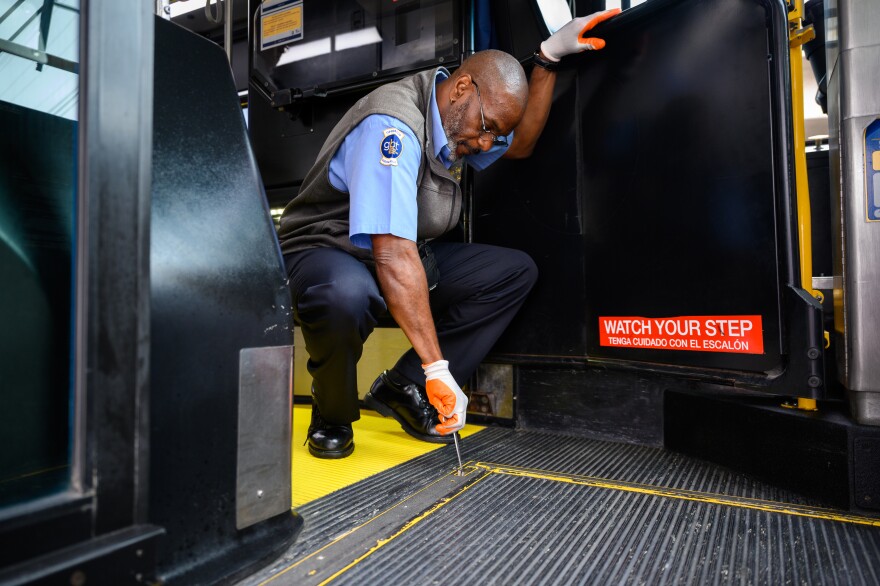Tosha Newton has been riding the bus in Bridgeport for almost two decades. She uses a wheelchair, and sometimes schedules rides in advance. However, she doesn't always know when they'll show up.
"Sometimes they're late," Newton said.
When that happens, Newton misses important appointments, which can be challenging to reschedule.
"Therapy appointments, and sometimes the regular doctor," she said. “They wouldn’t see me if I was too late."
Federal law requires transit agencies to provide equitable service to riders with disabilities. But in Bridgeport, there are questions about whether the local public transportation agency is meeting that goal.
Connecticut Public has learned that federal officials are investigating whether Greater Bridgeport Transit is satisfying its obligations under the Americans with Disabilities Act.
The agency operates fixed-route and paratransit bus services in Bridgeport, Fairfield, Stratford, Trumbull and half a dozen other communities in the region. Its paratransit service, called GBT Access, allows eligible riders to call and schedule a pickup.
However, the Federal Transit Administration concluded last year that Greater Bridgeport Transit's paratransit service was so unreliable that it didn't meet obligations under federal law.
An FTA review found in a single year, Greater Bridgeport Transit missed or denied more than 1,300 trips requested by riders with disabilities. And paratransit vehicles showed up late more than half the time.
“If half the time they're not even close to being on time, there's something wrong with that system," said Sheldon Toubman, a lawyer with Disability Rights Connecticut.
Doug Holcomb, the transit agency's general manager, said constraints on the capacity of the service in previous years stemmed from a shortage of drivers. Holcomb said the agency is now improving.
“We took a lot of steps," Holcomb said. "We increased wages to recruit more drivers. We introduced signing bonuses, retention bonuses, to keep the ones we have. We reduced credentials that were not legally required.”

Even so, records reviewed by Connecticut Public show the Department of Justice is also investigating whether Greater Bridgeport Transit complies with federal civil rights laws.
Minutes of the December 2022 meeting of the agency's board of commissioners indicate federal authorities "apparently received a complaint alleging some form of non-compliance with the transportation title of the Americans with Disabilities Act (ADA)."
The communication "was not specific to an event, series of events, or area of noncompliance," but rather federal officials "appear to be conducting a comprehensive evaluation of all areas of compliance," the minutes read.
Later minutes from June and July 2023 show staffers from the transportation agency were awaiting further communication from federal investigators.
The U.S. Department of Justice did not respond to a request seeking comment. Officials at the U.S. Attorney's Office for the District of Connecticut also did not respond.
Connecticut Public requested records about the federal probe directly from Greater Bridgeport Transit last year. The agency has yet to provide them. Holcomb declined to answer questions about the investigation.
“There's no resolution to the DOJ inquiry," Holcomb said. "And there was a lot of material. So, that's with counsel right now. So, I can't talk about the DOJ thing.”
Greater Bridgeport Transit started working with a different contractor to provide paratransit service in November 2021, according to federal records. That company, MV Transportation, referred our questions to the transit agency.
“Obviously, it isn't the quality of service that we wanted to provide," Holcomb said. "But we did try our best with the people that we had to accommodate everybody.”
Records reviewed by Connecticut Public indicate paratransit service has gotten better since the FTA review was published last year.
The FTA ordered Greater Bridgeport Transit to submit a plan by Sept. 25, 2023 describing how it would eliminate capacity constraints by improving its on-time performance, and by cutting the number of denied and missed trips. It was also ordered to submit monthly status reports to the federal government, beginning in October 2023.
Despite those improvements, Newton says she’s had other difficulties riding the bus. She says some drivers who operate fixed-route buses, which operate on a single route, don’t stop to pick her up when she’s waiting at the bus stop.
And she’s not alone. Connecticut Public reviewed complaints to Greater Bridgeport Transit and found a handful of other riders reported having similar experiences.
Newton says she’ll continue to ride the bus when she needs to. But she hopes her experience improves.
"If what's happening is that people with disabilities are basically being, you know, blocked from access to the community, then you can see how it presents a real problem for people," Toubman said.



